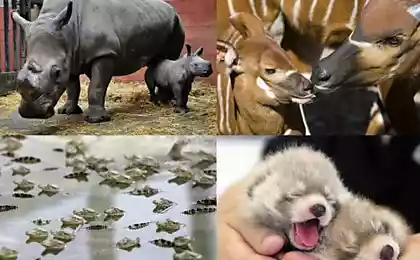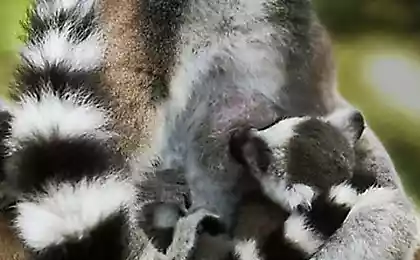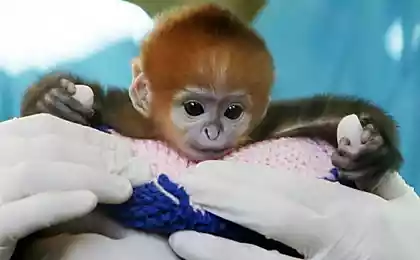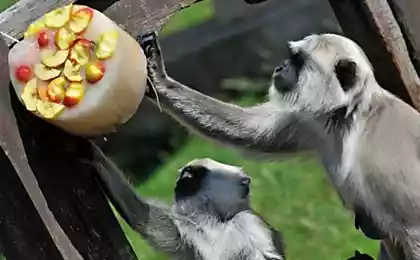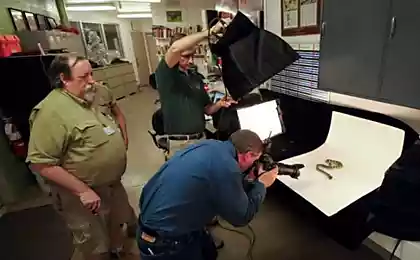422
Coati moved to a new home at London zoo
The London zoo (ZSL London Zoo) reports that five new coati that joined their relatives back in February, got along well and feel at home. All friendly company lives in one part of the zoo called "animal adventures" (Animal Adventure).

Photo: ZSL London Zoo
This area is intended for the youngest visitors. Here kids can see and even feed a variety of animals that are not dangerous to life and health of kids, as a rule, young animals.
But, coati so sweet and funny that quite meet all safety standards. Previously lived here, coati Bertie, Brush, Lola and Frankie (Bertie, Brush, Lola and Frankie). The new group consisting of three males and two females, was named the Rangers "Gang Scooby-Doo."

Velma, Daphne, Fred, shaggy and of course Scooby-Doo (Velma, Daphne, Fred, Shaggy and Scooby) perfectly accustomed on a new place in the company of their elders. All five of them are still very young (no year), so they can easily be distinguished among the rest, coati. In addition, they are distinguished by their playful (childlike) personality.
Of course, that Scooby is the most active and mischievous of all. Now, with the advent of spring, near their enclosure going to a lot of children who enjoyed watching "the Gang, Scooby-Doo," says Adam Davies (Adam Davies), a representative of the London Zoo.

— To be honest, we were very worried as our eldest coati would react to newcomers, as all the "Oldies" from the same litter. Fortunately, all went well. As soon as the youngsters entered the enclosure, then immediately found a common language with their elders, says Adam.
Scooby and his "gang" quickly adapted to the new place and even to some extent, feel themselves masters. They were seen on the tops of the trees, where they proudly sat, making it clear to everyone around them that they're in charge. And during feeding Scooby and his friends are already trying to push the older, coati.

One of the new females trying to drive away from food senior, Bertie the Brush, which in turn begin to circumvent it. According to experts, in the wild, this behavior is quite normal, as the female lead coati groups, and males stay apart.
Source: zoopicture.ru

Photo: ZSL London Zoo
This area is intended for the youngest visitors. Here kids can see and even feed a variety of animals that are not dangerous to life and health of kids, as a rule, young animals.
But, coati so sweet and funny that quite meet all safety standards. Previously lived here, coati Bertie, Brush, Lola and Frankie (Bertie, Brush, Lola and Frankie). The new group consisting of three males and two females, was named the Rangers "Gang Scooby-Doo."

Velma, Daphne, Fred, shaggy and of course Scooby-Doo (Velma, Daphne, Fred, Shaggy and Scooby) perfectly accustomed on a new place in the company of their elders. All five of them are still very young (no year), so they can easily be distinguished among the rest, coati. In addition, they are distinguished by their playful (childlike) personality.
Of course, that Scooby is the most active and mischievous of all. Now, with the advent of spring, near their enclosure going to a lot of children who enjoyed watching "the Gang, Scooby-Doo," says Adam Davies (Adam Davies), a representative of the London Zoo.

— To be honest, we were very worried as our eldest coati would react to newcomers, as all the "Oldies" from the same litter. Fortunately, all went well. As soon as the youngsters entered the enclosure, then immediately found a common language with their elders, says Adam.
Scooby and his "gang" quickly adapted to the new place and even to some extent, feel themselves masters. They were seen on the tops of the trees, where they proudly sat, making it clear to everyone around them that they're in charge. And during feeding Scooby and his friends are already trying to push the older, coati.

One of the new females trying to drive away from food senior, Bertie the Brush, which in turn begin to circumvent it. According to experts, in the wild, this behavior is quite normal, as the female lead coati groups, and males stay apart.
Source: zoopicture.ru
Garden swing – types and their characteristics
An Indian court has banned the fights and the race of bulls thanks to PETA


